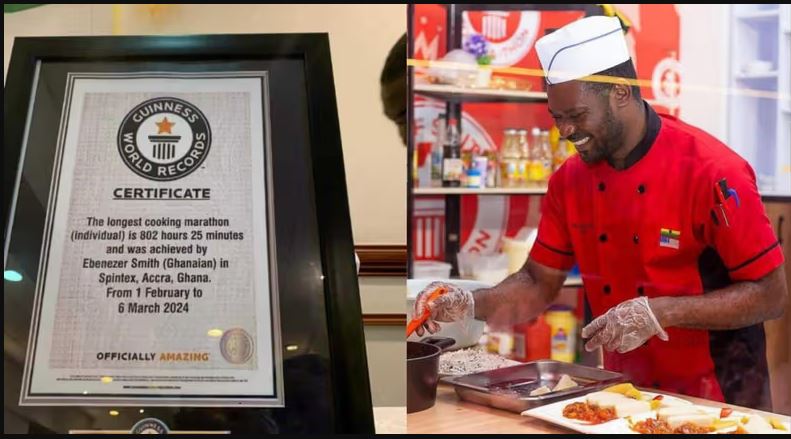
Lessons from Chef Smith fabricated record
The recent events surrounding Ghanaian chef Ebenezer Smith, known as Chef Smith, have brought to light the negative repercussions of fraudulent claims on the broader landscape of sustainable development in Africa.
Chef Smith’s announcement of setting a new Guinness World Record for the longest cooking marathon, which has now been exposed as fabricated, underscores the importance of integrity and authenticity in every sphere of life if sustainability in development must be given the seriousness that it deserves.
Chef Smith’s claim to have cooked for 820 hours from February 1 to March 6, 2024, was initially celebrated as a monumental achievement that would have brought the Guinness World Record for the longest cooking marathon back to Africa. However, his actions have now been reported as fraudulent, with the Guinness World Records confirming that the certificate he displayed was inauthentic. This revelation not only tarnishes Chef Smith’s reputation but also undermines the genuine efforts of those who strive for excellence in their respective fields.
CSR REPORTERS ululates that such fraudulent actions can have significant negative impacts. Salutary life is built on the principles of trust, transparency, and accountability. When individuals or organizations engage in deceptive practices, it erodes public trust and damages the credibility of every initiative such as the era we have found ourselves – the cookathon age!
Deceits like this is particularly detrimental in regions like Africa, where there is a growing emphasis on sustainable development and positive social impact. The fraudulent claim by Chef Smith diverts attention from genuine efforts and can discourage stakeholders like the Guinness Worth Records and others from supporting legitimate initiatives. The already rigorous scrutiny of GWR just might become even more rigorous whenever it is time to award legit people who have done well for themselves.
In the context of sustainable development, integrity is paramount. Sustainable development goals (SDGs) aim to address global challenges, including poverty. Fraudulent actions undermine these efforts and can lead to a loss of confidence in initiatives aimed at fostering sustainable development. For Africa, a continent with immense potential and unique challenges, maintaining credibility in sustainable development efforts is crucial for attracting investment and support from international stakeholders.
The fallout from Chef Smith’s fraudulent claim has also highlighted the importance of due diligence and verification in CSR and sustainability efforts. Organizations and individuals must ensure that their claims are verifiable and supported by credible evidence especially now that the National Assembly is big on CSR. This not only safeguards their reputation but also ensures that the impact of their initiatives is genuine and measurable. In this case, the swift response from Guinness World Records in debunking the fraudulent claim serves as a reminder of the importance of oversight and accountability in maintaining the integrity of records and achievements.
Moreover, the involvement of the police and the legal implications of Chef Smith’s actions underscore the broader consequences of fraudulent behaviour. The legal repercussions, including the detention of Chef Smith and his manager, highlight the seriousness of such actions and their potential to disrupt partnerships and collaborations. For instance, the fallout with Amadia Shopping Center, one of the sponsors, emphasizes how fraudulent actions can strain relationships with key stakeholders and hinder future collaborations.
It is essential for corporates across Africa to learn from this incident and reinforce their commitment to ethical practices. By adhering to the principles of integrity and transparency, organizations can build a solid foundation for their CSR and sustainability initiatives, ensuring long-term positive impact. This incident should serve as a call to action for all corporates to rigorously vet their claims and uphold the highest standards of honesty in their pursuits.
Indeed, Chef Smith’s fraudulent claim has brought to the forefront the critical importance of integrity in CSR and sustainable development efforts. Such actions have far-reaching negative impacts, not only on the individuals involved but also on the broader landscape of CSR and sustainable development in Africa. Corporates must take this opportunity to reaffirm their commitment to ethical practices, ensuring that their contributions to society are genuine and impactful. By doing so, they can foster trust, attract support, and drive meaningful change across the continent.









